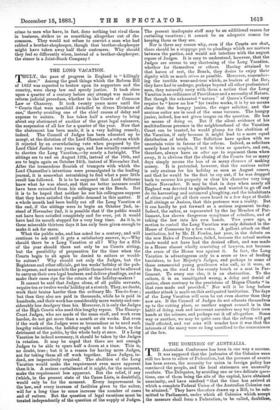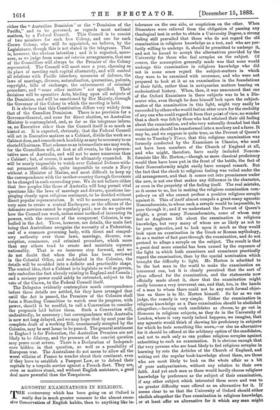THE DOMINION OF AUSTRALIA.
THE Australian Conference has been in one way a success. It was supposed that the jealousies of the Colonies were still too keen to allow of Federation, but the pressure of events has been severe, the necessity for union in foreign policy has convinced the people, and the local statesmen are unusually resolute. The-Delegates, by avoiding one or two delicate ques- tions, one of them being the site of the capital, have obtained unanimity, and have resolved " that the time has arrived at which a complete Federal Union of the Australian Colonies can be attained." They have therefore drawn up a Bill, to be sub- mitted to Parliament, under which all Colonies which accept the measure shall form a Federation, to be called, doubtless,
either the " Australian Dominion" or the " Dominion of the Pacific," and to be governed, as regards most national matters, by a Federal Council. This Council is to consist of two members for each free Colony, and one for each Crown Colony, who will be appointed, we believe, by the Legislatures, though this is not stated in the telegrams. That is, however, the obvious intention ; and it is expected, more- over, as we judge from some ad interim arrangements, that one of the Councillors will always be the Premier of the Colony represented. The Council will meet once a year, choosing as its place of meeting each capital alternately, and will control all relations with Pacific islanders, measures of defence, the laws of marriage, divorce, naturalisation, quarantine, patents, copyright, bills of exchange, the enforcement of criminal procedure, and " some other matters " not specified. Their decisions will be operative Acts, binding upon all subjects of the Dominion, and will be sanctioned by Her Majesty, through the Governor of the Colony in which the meeting is held.
It is obvious that this Constitution differs very widely from that of the Canadian Dominion. There is no provision for a Governor-General, and none for direct election, no Australian Ministry is contemplated, and, so far as the telegrams inform us, no Executive other than the Council itself is so much as hinted at. It is expected, obviously, that the Federal Council will act in Executive matters as a Cabinet, divide the work as a Cabinet does, and concede such headship as may be necessary to an elected Chairman. That scheme as an intermediate one may work, for the Councillors will, at first at all events, be the represen- tative men of Australia, and will not be more numerous than a Cabinet ; but, of course, it must be ultimately expanded. It will be nearly impossible to watch over Colonial Defence with- out permanent officials, quite impossible to create a Navy without a Minister of Marine, and most difficult to keep up the correspondence with the mother-country through Governors to be changed in each succeeding year. We do not believe either that free peoples like those of Australia will long permit vital questions like the laws of marriage and divorce, questions im- pinging closely upon religious sentiment, to be decided without direct popular representation. It will be necessary, moreover, very soon to create a central Exchequer, or the officers of the defensive services cannot be regularly paid ; nor do we quite see how the Council can work, unless some method of increasing its powers, with the consent of the component Colonies, is em- bodied in the Act. These, however, are details, the main fact being that Australians recognise the necessity of a Federation, and of a common governing body, with direct and compul- sory authority over those laws, marriage, divorce, con- scription, commerce, and criminal procedure, which more than any others tend to create and maintain separate nationality. That is an immense step forward, and we do not doubt that when the plan has been reviewed in the Colonial Office, and re-debated in the Colonies, the details will be moulded into a definite and practicable shape. The central idea, that a Cabinet is to legislate as well as govern, only embodies the fact already existing in England and Canada ; and a revisory power could safely be entrusted, subject to the veto of the Crown, to the Federal Council itself.
The Delegates evidently contemplate much correspondence before these details are settled, for they have arranged that until the Act is passed, the Premiers of the Colonies shall form a Standing Committee to watch over its progress, with power, should it be needful, to call a Convention to consider the proposals laid before them. Such a Convention will, undoubtedly, be necessary ; but correspondence with Australia is now not long delayed, and we may hope that by next year the complete draft of a working Bill, unanimously accepted by the Colonies, may be sent home to be passed. The general sentiment in England is for Federation, the Australian Premiers are not likely to be dilatory, and the pressure of the convict question may prove most severe. There is a Declaration of Independ- ence hidden in that question, as well as a possibility of European war. The Australians do not mean to allow all the worst villains of France to wander about their continent, even if they have to establish a Passport Law, or to defend their capitals by a torpedo service against a French fleet. They are, even as matters stand, and without English assistance, a good deal more powerful than the Tonquinese.











































 Previous page
Previous page